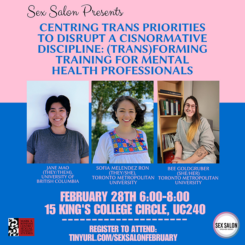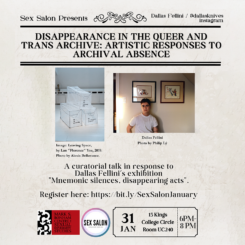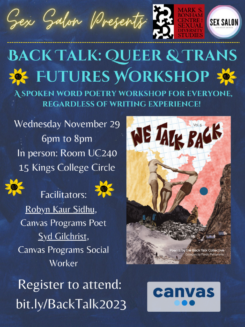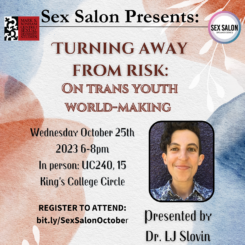Sex Salon
The Sex Salon is a monthly speakers series organized and hosted by graduate students from the Mark S. Bonham Centre for Sexual Diversity Studies, and meets on the last Wednesday of every month from 5:00 – 7:00 PM EST. Each month, Sex Salon invites scholars, both graduate students and faculty, to present new and in-process work and engage in discussion with guests and colleagues. Participants come from both the University of Toronto and the wider academic community across Canada and the US. Each month features two to four presentations around a central theme that relates to sexual diversity studies, followed by a Q&A based discussion lead by a member of the Sex Salon programming committee. The event is free to attend and typically held on the last Thursday of the month in University College. Calls for participants go out over the summer.
Any further questions and inquiries can be sent directly to sds.sexsalon@gmail.com.
2023-24

February: Centring trans priorities: (Trans)forming training in mental health
During this event, we will discuss our trans-led project, in which we collaborated with 49 trans and nonbinary people to develop anti-oppressive educational case studies for mental health professionals to learn about trans health. The aim of these case studies is to centre trans priorities and mobilize practical and relational changes with the long-term goal of abolishing cisnormative, transphobic, transnormative, and pathologizing practices in mental health practice. We look to support a wider movement of (trans)forming existing power structures to enable trans people to feel safe, have their needs met, and thrive on their own terms. Our session may be of interest to those in the service field and those looking to create gender transformative action at their organizations, while also helping us strengthen our network with trans communities.

January: Disappearance in the Queer and Trans Archive: Artistic Responses
A conversation with curator Dallas Fellini, who will lead a discussion on the role that absence plays within trans and queer archives. This talk will centre on Fellini’s exhibition “Mnemonic silences, disappearing acts,” currently on view at the Jackman Humanities Institute at University of Toronto. This exhibition grapples with the absences, erasures, and censorships that colour the queer and trans archive, seeking alternative forms of queer memory-keeping, documentation, and storytelling. Looking at the work of artists Kasra Jalilipour, Jordan King, Kama La Mackerel, Hazel Meyer and Cait McKinney, and Lan “Florence” Yee, this talk will consider artistic strategies of fiction-making, critical imagining, and revisionism as responses to histories of queer and trans people that are insufficient, compromised, colonial, or simply absent.

November: Back Talk: Queer & Trans Futures Workshop
Back Talk: Queer & Trans Futures Workshop is a spoken word poetry workshop for everyone, regardless of past creative writing experience. This poetry workshop encourages participants to reflect on who they are and what they love. We will explore what the ideal future for queer & trans people could look like, while also reflecting on things we currently have. This is a writing space for imagining futures, dedications to community care and self-love, telling our stories and what it means to create loving and gentle spaces together. Prior to the writing workshop, facilitators will share with the group the impact the Back Talk program has had, and a couple of Back Talk Collective members will share a piece of their poetry.

October: Turning Away From Risk: On Trans Youth World Making
In North America, we are currently witnessing heightened conversations regarding the bodies, experiences, and lives of trans youth. There is a proliferation of fearmongering about their existence, leading to books bans, the blocking of gender-affirming healthcare, and legislation that criminalizes discussions of gender and sexuality in schools. These denunciations are mired in widespread understandings of adolescence as a risky period of life. Legislators, parents, and activists on all sides of these issues position children and youth as vulnerable and in need of protection. Reactionary and conservative adults frame youth as at-risk from learning about ‘controversial’ topics like gender and sexuality in schools while more progressive advocates warn of the possibilities of harm in censoring this knowledge. In this talk, I resist these frameworks and instead consider the agentic ways trans youth are already moving through schools. Drawing on data from a yearlong ethnography with trans youth in a high school in Western Canada, I explore how trans youth daily perform the complex labour of creating other worlds, both on their own and collaboratively, outside of the cisheteronormative logics of their school – worlds where they are not constrained by adults’ limited and limiting ideas about gender and what it means to be trans. I am interested in the ways youth reject notions of vulnerability as well as adults’ attempts at protection through the worlds they created as they worked to not just survive school but also to explore, understand, and revel in their gender nonconformity.
Archive
2022-23
- April: Do you Queer What I Queer: Live Podcast
- March: We’re hot, we have sex, and we’re good at it!”: A Conversation at the Intersection of Sexuality, Disability, and Youth
- February: Performance Studies Roundtable: Feminist & Queer Critiques
- January: Black Queer Identity Expression, Community Building, And Sense of Belonging
- November: Exploring and Making Trans Worlds
- October: Queerspawn in Queer Communities
2021-22
2020-21
- January: “It’s the Cannabis and Sex Positivity for Me”: A Field Guide to Elevating Intimacy with Cannabis Use
- February: Poz & Hi in COVID-19: An HIV Research Red Table Talk
- March: The Museo de Machistán: Creating an Archive and Digital Exhibit of Mexican Lesbian Nightlife
- December: Touching Death: Theorizing Black Queer Afterlife in Times of COVID-19
2019-20
2018-19
2017-18
2016-17
2015-16
- January: “Speaking” Sex to Power: Pedagogies of Intimacy and Epistemologies of Touch
- February: Homonationalism and Transnational Sexual Politics
- March
- April: Outside the Lines: Queer Art and Activism
- September: From The Margins: Race, Ageing, and Queer Temporality
- October: Citizenship, Migration, and Violence
- November: Asexualities, Hypersexualities, and Maximum Visibility

